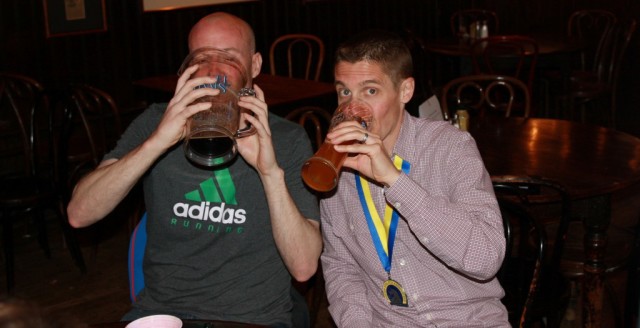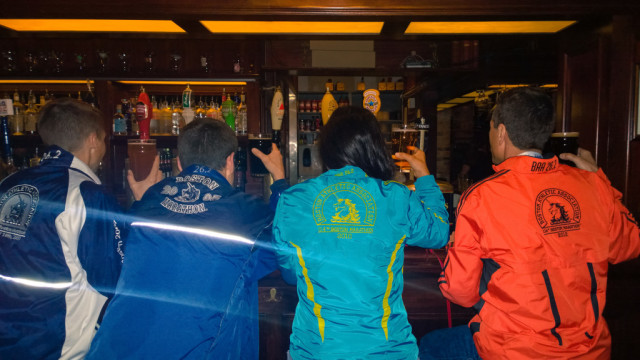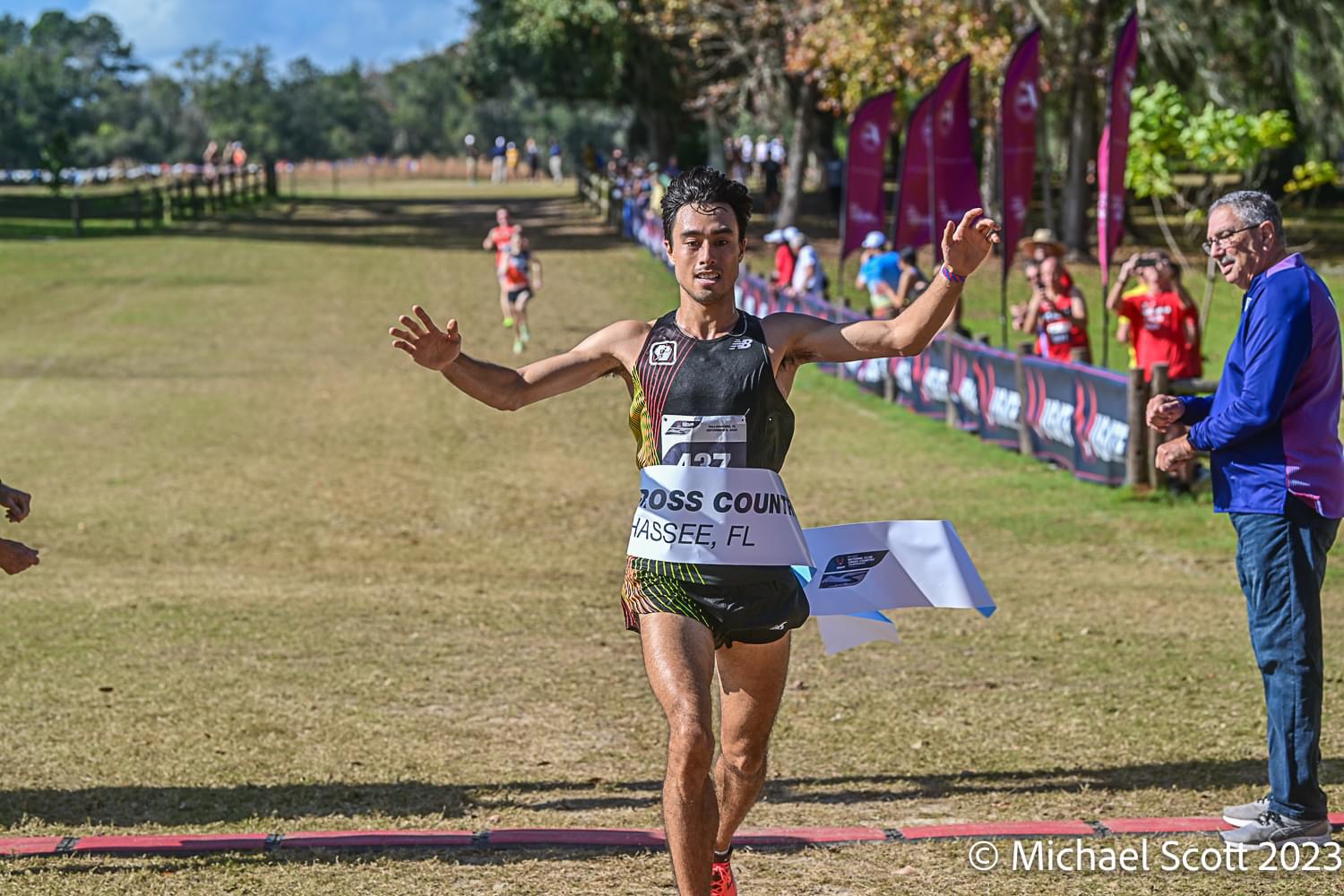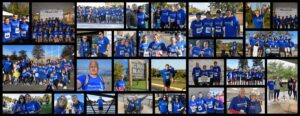
Show us your Runspringa
The mylar blanket, the medal, even the shoes, they all come off. The painful shower, alerting you to chafing that went unnoticed in the heat of the race, washes away the last of the sweat that went into this whole enterprise.
It’s time for a break, either by choice — and in the name of good sense — or by necessity, because the thought of running again right now seems almost barbaric. If you don’t think so, just try walking down a flight of stairs.
Maybe it was a PR, a BQ or a OTQ. Maybe it was a disaster. Either way, it’s over and life is back to normal.
What will that life be?
The Amish have a tradition — Rumspringa — in which their teenagers live in the secular world to decide what life they want to lead, if they want to come back. Marathon runners do the same thing. They toss their training logs aside, stay out late, eschew the (sometimes) monastic life they’d built for themselves. And they figure out if it is really for them. It’s Runspringa.
D.C.’s Nick Geboy tries to take time off, but his Catholic guilt keeps pulling him back in.
“I feel lazy and gross when I don’t run,” he said. “I come back easy, but I go through the same routine as usual.” It’s back to the track on Wednesdays, but he limits his volume to about a mile and a half of hard running. He’ll take the opportunity to do more runs with his coworkers around the U.S. Geological Survey office in Reston.
“I’ll eat more meat than usual,” he allows. “I typically avoid it when I’m training, it makes me feel slow.”
Alissa McKaig is in the same boat.
“I’ll eat things I normally wouldn’t, like cupcakes or a big sandwich,” she said. She looks past her mild gluten allergy to enjoy herself.
McKaig, recent transplant to Washington, D.C., has gotten the hang of the distance in her four tries, including an eighth place finish at the U.S. Olympic Marathon Trials in 2012. But she has also mastered the aftermath.
“You worked really hard for one day, for the most part you kind of go under a rock for a while,” she said. “But you have to celebrate. Even if it didn’t go well, you’re happy to be done.”
Trips to see family in Indiana, or vacations in Florida, have taken McKaig away from the familiar settings, where training predominates. And immediately after the race, she makes it a point to go out and be sociable, which surprises friends who haven’t run a marathon.
“They ask how I’m not exhausted, but you find energy, just like you do during a race,” she said. “I’ll be back in by 11:30, which is when most people are usually leaving to go out, but before a race I don’t usually feel like talking, so after it’s over I can relax and be more social with people.”
Germantown resident Erica Greene feels her on that.
“When I register for a marathon, my friends know I’m not going to see them too much,” she said. “I don’t go out late on Friday and Saturday nights when I’m training, and I limit my alcohol intake, so after the race is over, I’m pretty eager to catch up with everyone and have a good time, get back to normal.”
Normal, the common refrain. As nebulous as that could be, normal typically means some flexibility that returns when at least an hour that was otherwise spent running, stretching or taking an extra shower comes back into the day. It could mean the chance to sleep in, which Greene relishes, or time after work to do with as you please. Almost a month after her spring 2014 marathon, a D.C. resident who didn’t want to be identified for fear of reprisal because she criticized her job’s workload, didn’t feel like she had enjoyed a Runspringa.
“Not really, because I’ve been working until at least 7:30 every night and happy hour is over,” she said. “You have to go to a few happy hours and do the hard drinking before you go back to the hard training.”
But just like the Amish, who may lose up to 20 percent of their communities after Rumspringa, some marathoners don’t come back.
Chevy Chase’s Jeff Mehr just finished Boston a few weeks ago, and he doesn’t see himself running a marathon anytime soon. It’s worth noting that Boston was his 25th, well beyond the one he wanted to finish years ago. And that means it’s different for him because this is breaking a cycle that has continued for a while.
“Most people I know are signing up for another one within three days of finishing,” he said. “They’re living off that high, whether it comes from a fast time, or a fun weekend with friends. Some people don’t know what to do if they’re not training for a marathon.”
He’s seen other runners start to consider time off, and said even before he decided on his hiatus, doing what his body told him was trending in that direction.
“I feel like every spring, the two or three weeks I have planned to take up gets longer and longer,” he said. “Sometimes it gets up to four weeks, five weeks, and I groan, thinking about getting back to the track to do speed work or getting up for a 20 miler. If there’s no offseason, then there’s no ‘onseason.'”
Even for professionals like McKaig, or even more so, because their livelihood depends on it, taking time off is crucial.
“There’s a lot of temptation to get back to running too soon,” she said. “You can be pumped up by a great time and want to keep things going, or you want to redeem yourself, but you definitely need time off. After the trials I wanted to keep going and roll into a good track season, but that wasn’t going to happen if I didn’t take care of myself. A marathon takes a lot out of you, and not taking that time off can put you in a hole that could cost you that track season, or even the next marathon.”
You can also take it too easy, as Justin Schappe found out. He made a quick approach to the marathon, roughly 18 months after starting running. His run up to the Chicago Marathon in 2011 was guided by a strict regimen. In addition to his running and cross training, he was pitching in more around the house to help his pregnant wife, and he planned the family’s move to Rockville from St. Louis.
“It was a pretty strict life,” he said. “I was looking forward to the race, but also to getting back to everything else.”
The race itself melted in the back half of a sunny day.
Afterward he sought out Giordino’s pizza and a lot of beer, and took a few weeks off of running, and cross training. A few months later, his brother recruited him for the St. Louis Marathon, and during a training run, Schappe felt his knee give way. He spent more than a year recovering from runner’s knee, which he attributed to a lax cross-training schedule.
He’s back in action and his eyes are on this fall’s Marine Corps Marathon. And he has two definite plans for Runspringa.
“I’m going to have some great pizza afterward and I am not going to stop cross training,” he said.
Many runners shared the advice that a marathoner needs someone to keep them accountable, not for their training, but for their recovery.
“Even if you’re not a professional, you need someone to advise you on when it’s okay to come back,” McKaig said. “It’s easy to think you’re fine and can start running but it will set you back if you do it wrong.”
At least one, certainly more, Rock ‘n’ Roll USA Marathon runners did it right. The race is typically the Saturday of St. Patrick’s Day weekend.
“I pretty much started drinking right after the race and didn’t stop,” she said.
After that, what choice is there but to take time off?
This article originally appeared in the July/August 2014 RunWashington.

Recent Stories
Looking for our race calendar? Click here Submit races here or shop local for running gear
James W. Foley Freedom Run
Inspired by the moral courage of freelance journalist James Foley, the mission of the nonprofit Foley Foundation is to secure the freedom of Americans held captive abroad unjustly by terrorist organizations or rogue states, and to promote journalist safety.
The
Kensington 8K Race
Since 1994, the Kensington 8K Race has been a favorite DC area fall race – a fun, fast event with beauty, challenge, and excitement. Run it this year on Saturday, September 21, 2024!
The 8K distance is $39, with a






